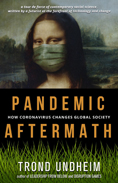
 |
Pandemic Aftermath: How the Coronavirus Changes Global Society
by Trond Arne Undheim, Ph.D.
Atmosphere Press
Social scientist and futurist Undheim examines the Covid-19 pandemic through contrast and comparison to the 1917-18 influenza pandemic and the nine known pandemics of bubonic plague (occurring intermittently over several centuries), analyzing how these diseases impacted societal stability. Following this examination of “forces of disruption” that lead to pandemics, and the resulting problems exacerbated by failures to prevent, contain, and track the outbreaks, the text explores possible consequences, changes, and innovations through five fictional but realistic near-term scenarios: “borderless world,” “nation-state renewal,” “two worlds apart,” “Hobbesian chaos,” and “status quo.” The detailed, first-person scenario narratives vividly illustrate how our modern global society could manage a pandemic or flounder in chaos as a result. “A crucial skill in this new situation is to learn to track changes in emerging tech, policy, business, and social dynamics as a strategic framework that presents clear priorities… interrelationships to be aware of, and gaps to fill.”
The informative narrative is well-rounded and well-researched, and the conversational style is easily understood despite the technical jargon of the academic discourse. The spare use of in-text citations in the nonfiction portions of the book is less distracting for the reader, and the ample bibliography makes up for the minimal documentation. The text is suitable for both popular reading and classroom use, and the takeaways and exercises at chapter endings deepen the learning experience by fostering thoughtful consideration of the scenarios that could play out as humanity learns to cope with a potentially long-term pandemic. Undheim’s critical but creative analysis addresses the questions many individuals grapple with during a global health crisis. It offers hope and pays homage to human adaptability and our inherent will to survive, innovate, and thrive under challenging circumstances.
RECOMMENDED by the US Review